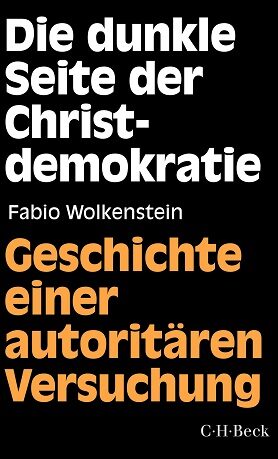Fabio Wolkenstein
Die dunkle Seite der Christdemokratie. Geschichte einer autoritären Versuchung
[The Dark Side of Christian Democracy. The History of an Authoritarian Temptation]
- C.H.Beck Verlag
- Munich 2022
- ISBN 978-3-406-78238-1
- 222 Pages
- Publisher’s contact details
For this title we provide support for translation into the Italian language (2022 - 2024).
Sample translations
Contra Liberalism and Socialism: A History of Christian Democracy
Wolkenstein demonstrates how a popular current of Catholic party politics up until the Second World War regarded not democracy, but monarchism, aristocracy and even dictatorship as the optimum form of state. Skeptical and sometimes directly hostile to democracy, this current of thought made the anti-modernism of the Roman Catholic Church its own. At the same time, Wolkenstain concludes, “From the historical perspective, conservative parties have often played a leading role in stabilizing democracy.” Christian democracy thus unites contradictory programmatic and ideological tendencies, among other things, in order to bring together different segments of society in big-tent parties.
This is immediately apparent in the relationship of political Catholicism to the Catholic Church. Wolkenstein explicates how ideas and formulations from various papal encyclicals recurred in the policy statements of many Catholic intellectuals and politicians. Conversely, numerous self-appointed Catholic parties took great pains to remain politically independent from the pope and curia.
Western European Christian democracy of the sort we have known since the Second World War in the form of a impeccably democratic political parties cannot claim to be the only “true Christian democracy.” Viktor Orbán, the Hungarian prime minister and chairman of the originally liberal Fidesz party, who nowadays styles himself as the defender of Christian democratic values, could claim with equal justification that Western Christian Democrats “have for quite some time no longer pursued Christian democratic policies.”
Since the nineteenth century, political Catholicism has been heavily influenced by Christian social teachings, which for their part are an answer to the rapid development of capitalist societies and the political self-organization of the working classes into socialist parties. Christian- or, more precisely, Catholic-inspired politics was always directed equally against liberalism and socialism. Even today we can detect in the policies of Germany’s CDU and CSU, which as a quasi-ecumenical enterprise represent an exceptional case of Christian democracy, a distant echo of Pope Leo XIII’s encyclical “Rerum Novarum”, his response to the class conflicts of his day. “The papal answer to the social question was not eradicating inequality, but managing it harmoniously,” writes Wolkenstein.
But social harmony doesn’t presuppose democracy. It’s less surprising that there are many undemocratic tendencies in political Catholicism, Wolkenstein concludes, than “that are also democratic currents.” Only the experience of Stalinism and National Socialism allowed democracy to appear in a more positive light to modern-day popes and many Catholics. Yet the Christian democratic social position of harmonizing class relations remains by no means dependent on a democratic constitutional framework, as Wolkenstein illustrates in the histories of various political parties. “Even long after the Second world War, Europe still had decidedly authoritarian Catholic regimes that subscribed to social integration, class compromise, accommodation of competing interests and, implicitly, pluralism.” Wolkenstein cites as an example the “Estado Novo” of the ascetic, pious Portuguese technocrat Salazar, with whom many Christian democratic politicians elsewhere in Europe maintained excellent relations. Even after the Second World War, many of the protagonists of political Catholicism found that an authoritarian caste society was perfectly compatible with a harmonious compromise of interests.
Wolkenstein sees the current reawakening of Christian authoritarianism in Hungary and Poland as an “especially vivid example of the cyclical surges of traditionalist and in part anti-democratic forces within political parties that claim to defend Christian values.” To conclude his persuasive, intellectually rigorous and readable work of intellectual history, Wolkenstein discusses the fact that many Christian democrats today find the policies of Orban both tenable and in keeping with the Christian democratic outlook. The author largely refrains from handing out advice to the Christian democratic camp, but he does ultimately propose that Christian democrats would do well to spend less time “scratching around for ideas from previous centuries” and to remember instead the words of Bavarian Christian democrat Franz Josef Strauss and “march on at the vanguard of progress.”

By Ulrich Gutmair
Ulrich Gutmair is a cultural critic for taz newspaper. An English translation of his book about post-reunification Berlin The First Days of Berlin. The Sound of Change has recently been published by Polity Books.
Publisher's Summary
In Hungary, Viktor Orbán's Fidesz party is currently in the process of liquidating democracy, invoking the Christian democratic tradition particularly emphatically as it does so – an indecent affront, one might think. But how serious have Christian democratic parties been in the past when it comes to liberal democracy?
At the end of World War II, Christian democracy celebrated its victories throughout Europe. Prudent statesmen like Konrad Adenauer, Alcide de Gasperi, and Robert Schuman insisted on peace, rebuilding, and stability. However, Christian democracy also had a dark side in postwar Europe. The authoritarian spirit of reactionary political Catholicism continued to hold sway, which was revealed in many Christian democrats' blatant admiration for dictators like Franco and Salazar, or their tense relationship with the free press and the institutions of liberal democracy. With the gradual renunciation of conservative positions – in Germany above all during the Kohl era – Christian democracy ultimately experienced a sustained surge of democratization. But the price it paid was the loss of its ideological core. In this book, Fabio Wolkenstein looks back at the long, eventful history of Christian democracy in Europe and inquires into the authoritarian temptations that it has resisted but also given into, thereby tracing an arc to the present: What strategies are Christian democratic parties employing today to gain power?
(Text: C.H.Beck Verlag)
